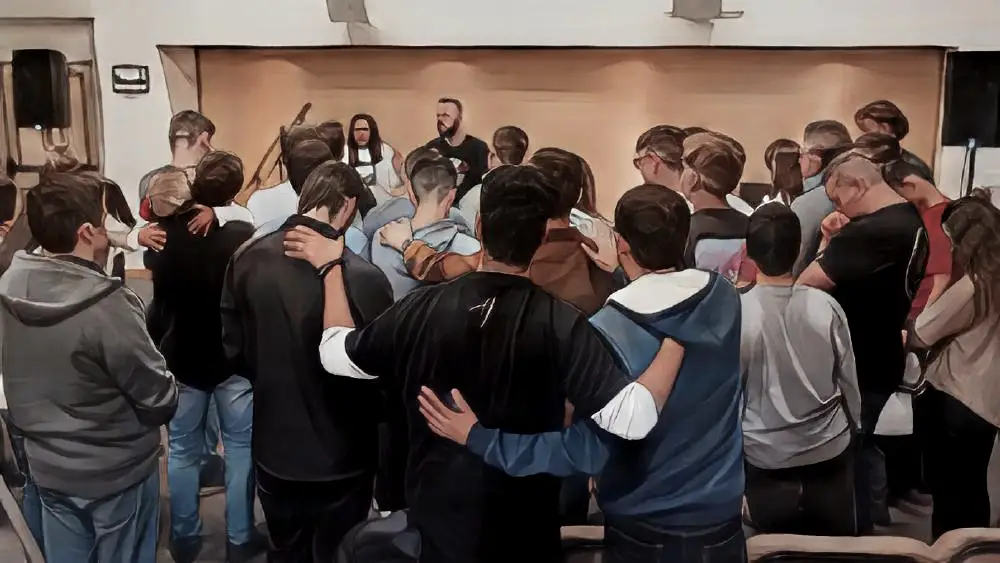It was a chilly Sunday evening in December. Martin remembers how at 10 years of age his mother frantically pulled him aside.
With worry etched on her face, she instructed him to kneel and pray for his gravely ill baby sister, that she might not die. Leaving him alone with those heavy words, his mother exited the room.
“Even as a small child, tension filled the air. I was confused about who God was and what death meant,” Martin later recounted.
Though unsettling, this profound moment sparked Martin’s lifelong journey with intercessory prayer.
We’ve all had those heart-wrenching situations where the natural response is to pray—to appeal to a higher power for intervention, healing, or peace for loved ones.
Intercessory prayer—the act of praying for the needs of others—has been a cornerstone of the Christian faith since biblical times.
When we intercede, we unleash the power of God into impossible circumstances.
What is Intercessory Prayer?

Intercessory prayer is praying for the needs of others. The word “intercession” comes from a Latin word, meaning “to stand between”. An intercessor prays on behalf of another person, group, or situation.
The Bible is overflowing with examples and exhortations to lift others in prayer:
“For this reason, confess your sins to each other and pray for each other so that you may be healed. The prayer of the righteous person is powerful in what it can achieve.”
James 5:16 (CEB)
biblegateway.com
“First of all, then, I ask that requests, prayers, petitions, and thanksgiving be made for all people.”
1 Timothy 2:1 (CEB)
biblegateway.com
Jesus himself modeled a lifestyle of constant prayer and intercession for his disciples and all believers (John 17).
The Broad Availability of Intercessory Prayer

You can pray for any need or crisis imaginable. Some intercessors specialize in praying for specific needs like illness, abuse, addictions, or relationship issues.
However, intercessory prayer covers far more than just healing—it releases God’s revelation, wisdom, and blessings into any circumstance.
Perhaps you feel called to pray for the peace and prosperity of your city or nation. Or maybe God has put on your heart a desire to pray for the persecuted church, refugees, orphans, or victims of human trafficking around the world.
The subjects of our prayers are as vast as the imagination of our infinite God. You can pray on behalf of somebody else—for another person’s healing, provision, for a situation, for a city, for your church—whatever it is.
Intercessory prayer is praying on behalf of someone else.
The Power of Intercessory Prayer in Intimacy with God

While the answers we seek are important, the ultimate desired outcome of intercessory prayer cannot be the answer itself. Instead, the highest aim should be increased intimacy with our Heavenly Father.
As you intercede for others, you tune your heart to experience more of God’s immeasurable love, wisdom, and power.
You’ll learn to listen for His “inaudible voice”, discerning the desires of His heart. Your motives will be realigned as you pray,
“Lord, you love this person. I know you have your absolute best in mind for them, which is far greater than they can currently envision.”
By praying in this way, you’ll fulfill Jesus’ invitation to:
“Ask, and you will receive. Search, and you will find. Knock and the door will be opened to you.”
Matthew 7:7 (CEB)
biblegateway.com
You’ll open the door for God’s purposes to be unleashed, while simultaneously drawing closer to Him.
The Calling to Intercessory Prayer in the Bible

Jesus was the ultimate model and example of Someone constantly living a lifestyle of prayer.
The Gospels depict Him rising early, staying up late, and even dismissing His disciples so He could retreat to desolate places and pour out His heart to God the Father in prayer.
Jesus didn’t simply pray alone, however. He also brought His disciples into these sacred times of fellowship with God.
“About eight days after Jesus said these things, he took Peter, John, and James, and went up on a mountain to pray.”
Luke 9:28 (CEB)
biblegateway.com
By His words and actions, Jesus trained His followers to be potent ministers of intercessory prayer:
“18 Truly I tell you, whatever you bind on earth will be bound in heaven, and whatever you loose on earth will be loosed in heaven. 19 Again, truly I tell you, if two of you on earth agree about anything you ask for, it will be done for you by my Father in heaven.”
Matthew 18:18-19 (NIV)
biblegateway.com
Following Jesus’ example, the early church was marked by a culture of bold, persistent group prayer (Acts 1:14, 4:23-31, 12:5).
“They all joined together constantly in prayer, along with the women and Mary the mother of Jesus, and with his brothers.”
Acts 1:14 (NIV)
biblegateway.com
“So Peter was kept in prison, but the church was earnestly praying to God for him.”
Acts 12:5 (NIV)
biblegateway.com
The Apostle Paul was certainly a leader in this movement, urging believers in Philippi to pray about everything:
“Don’t worry about anything; instead, pray about everything. Tell God what you need and thank him for all he has done.”
Philippians 4:6 (NLT)
biblegateway.com
Time after time, when Paul was suffering or facing opposition, communities of believers rallied in intercessory prayer for his protection, provisions, and powerful ministry of the gospel (Romans 15:30-32, Ephesians 6:19-20, Colossians 4:3).
“Pray for us, too, that God will give us many opportunities to speak about his mysterious plan concerning Christ. That is why I am here in chains.”
Colossians 4:3 (NLT)
biblegateway.com
The Role of Intercessory Prayer in Christian Community

While a deeply personal act, intercessory prayer was never meant to be a solo performance. It forges bonds of love and spiritual intimacy within the family of God.
As we open our hearts to pray for each other and together experience breakthrough answers to prayer, our sense of community and belonging is strengthened.
We feel the reality that we are truly interconnected members of one body, co-laboring with Christ.
Beyond our local congregations, intercessory prayer fuels the advancement of the Great Commission—the missional call for all people to know Christ.
Movements of united, fervent prayer have historically ushered in mighty seasons of salvation and revival.
When believers collectively pray, strongholds are broken, healing and deliverance are released, and the Kingdom of God advances.
Paul wrote:
“3 For though we live in the world, we do not wage war as the world does. 4 The weapons we fight with are not the weapons of the world. On the contrary, they have divine power to demolish strongholds.”
2 Corinthians 10:3-4 (NIV)
biblegateway.com
Practical Tips for Engaging in Intercessory Prayer
While intercessory prayer is spiritually profound, it can be remarkably simple to practice:
- Set aside time and space: Just as any relationship requires quality time invested, so too with our relationship with God. Intentionally create a distraction-free environment conducive to prayer and listening.
- Start by listening: Before speaking, quiet your soul and ask the Lord to reveal His desires and purposes. Ask the questions, then expect answers.
- Pray in agreement with others: There is synergistic power when two or more pray in one accord. Recruit prayer partners—spouses, families, small groups, church ministries.
- Keep a prayer journal: Record specific prayer requests, answers, impressions from the Lord, gratitude, and any breakthroughs. This will help build your faith over time.
- Persevere in intercession: Like the persistent widow (Luke 18:1-8), keep praying tenaciously, even when answers seem delayed. Trust in God’s perfect timing.
Above all, approach intercessory prayer with a heart of humility, surrender, and expectant faith.
Remember, it’s not about your eloquence or efforts, but God’s grace responding to the slightest cry from a sincere heart.
Key Takeaways
- Intercessory prayer is praying on behalf of others—their needs, crises, situations, communities, or nations.
- The ultimate aim is increased intimacy and alignment with God’s heart and purposes.
- Jesus modeled a lifestyle of intercessory prayer for His disciples to follow.
- Intercessory prayer fuels the Christian community, mission, and the advancement of God’s Kingdom.
- Practical ways to engage in intercessory prayer include setting aside time, listening, praying in unity, journaling, and persevering.
Conclusion
In summary, intercessory prayer unlocks the miraculous power of God to intervene, deliver, heal, transform, and save.
As you embrace this divine invitation, may you experience the profound blessing of God’s presence and see His Kingdom purposes unleashed in your life and the lives of those around you.
Frequently Asked Questions
Q. What’s the difference between prayer and intercessory prayer?
A. Prayer is simply communicating with God through words, thoughts, and listening. Intercessory prayer is a specific type of prayer where you pray on behalf of others and their needs, rather than just for yourself.
Q. Why is intercessory prayer so powerful?
A. Intercessory prayer aligns us with God’s heart, will, and purposes for others. When we pray in agreement with God, Scripture promises that our prayers have tremendous spiritual power and effect (James 5:16).
Q. Can I pray for someone without their knowledge or permission?
A. Absolutely! People often request prayer from others precisely because they are unable to pray effectively for themselves due to difficult circumstances. Lifting others in prayer, even anonymously, is a profound blessing.
Q. How do I know if God wants me to be an intercessor?
A. If you have a persistent burden or desire to pray for certain people, places, or issues, that is likely the Holy Spirit’s leading.
Start by obeying that inner prompting to pray. Over time, as you remain faithful, God will increase your passion and insights for this ministry.
Q. Do I need special training to be an intercessor?
A. No special credentials are required—only a willing heart, regular practice praying, and ongoing spiritual growth and discernment.
However, finding a mentor who is experienced in intercessory prayer can help accelerate your development.








Hi my loved one I wish to say that this post is amazing nice written and include approximately all vital infos Id like to peer more posts like this.